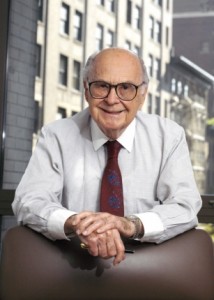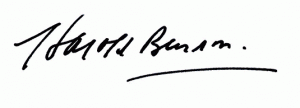This post is part of The Plank Center’s Legacies from Legends in PR Series that was begun in recognition of the 40th Anniversary of the Public Relations Student Society of America in 2007.
Described by PRWeek as the “architect of the largest public relations agency in the world” and “the century’s most influential PR figure.” Counselor and confidante to corporate and government leaders for more than 50 years. Founder of Burson-Marsteller. Recipient of numerous honors and awards, including the PRSA’s Gold Anvil (1980), the Arthur W. Page Society’s Hall of Fame (1991) and the Alexander Hamilton Medal from the Institute for Public Relations (1999). Named PR Professional of the year by Public Relations News (1997 and 1989).
The question most often asked to me by students and recent graduates is along the lines of, “Mr. Burson, what is your best advice for us as we start our careers in public relations? What are the three or four things you think will count most as we pursue a career in public relations?” This is what I tell them:
Networking is the most important activity you can undertake, starting now. Approach it in terms of building a support infrastructure you can tap into as your career and your life go forward. But never think that networking is simply a matter of knowing people. To be effective, it takes an underlying relationship–shared experiences–and you’ve got to work at it. Just one example of the payoff: When I ask newly recruited employees how they happened to come on to Burson-Marsteller, no less than half say, “I knew someone who knew someone.” You get the point!
Working as a member of an organization–a team–is an essential in most careers, especially business. My successor as B-M CEO, Jim Dowling, put it this way: “We prize the individual; we celebrate the team.” It is essential that you earn the trust of those around you: not only your boss, but also your peers and, equally important, the people who work for you. My late partner, Bill Marsteller, maintained that, “Your direct reports are the ones who really ‘nominate’ you for promotion to higher responsibility.” At Burson-Marsteller, more than half of all involuntary separations of professional employees are due to an employee’s inability to work with his/her teammates–to “fit in” as a member of the organization.
Never cease working to become a better writer and a more effective speaker. One of the scarcest commodities in public relations today is competent writers. My observation is that the newly-hired staffer who demonstrates a strong writing ability soon becomes one of the office’s most billable employees. There is always a need for good writing, and word spreads fast.
Develop as broad a knowledge base as possible. In public relations, all kinds of problems arise. And as consultants, they do so in all aspects of social, political and economic endeavors. Strive never to be caught tongue-tied because of a total lack of knowledge even on a subject remote to your daily existence. The old fashioned way of doing this has been by reading–traditionally, newspapers, magazines, books and, of course, television and radio. The new way is the Internet, about which most of you are far more au courant than I. The best advice my Father ever gave me was, “Try always to be in the know.”
I offer good wishes to all recent graduates seeking careers in public relations. Even after so many years, I well remember my early years and the numerous individuals who contributed to whatever success has been heaped upon me. I could never have done it alone–and I believe, many years from now, you will feel as I do.
Published: 2007
More from Harold Burson:

